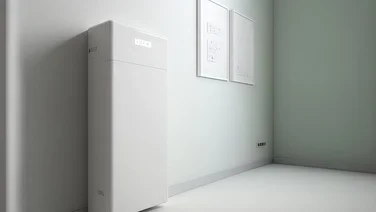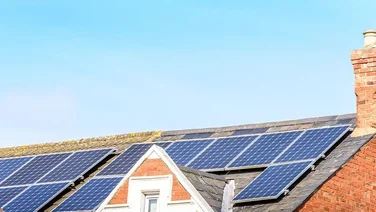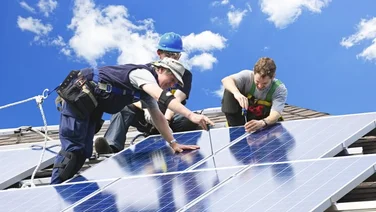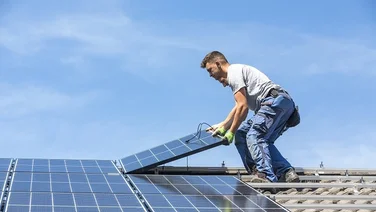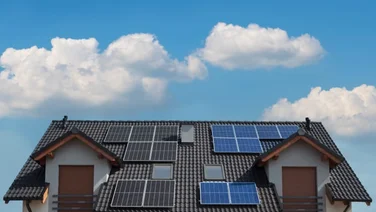We receive a small fee from trusted installers when you request a quote through our site. This helps us keep our content independent, well-researched and up to date – Learn more
- What are solar panels, and how do they work?
- Do solar panels work well in the UK?
- Are solar panels right for your home?
- How much do residential solar panels cost?
- How much can you save with solar panels?
- Solar panel savings by region in the UK
- How are solar panels installed?
- Do solar panels increase the value of your home?
- The pros and cons of solar panels for your home
- How to look after your solar panels
- What are the best solar panels for your home?
- What are the best solar panel installers?
- Do solar panels work with heat pumps and EV chargers?
- Summary
- Thinking about solar panels? We break down the costs, savings, and how they work.
- Cut your energy bills and carbon footprint with tech that’s simpler and smarter than ever.
- From roof suitability to government grants, here’s everything you need to know before you go solar.

Solar panels can massively cut your electricity bills, carbon footprint, and dependence on the National Grid. People who want to cut their bills often ask ‘how much are solar panels?’ The answer is that they get cheaper each year, with prices falling by 4.5% between March 2024 and 2025.
Here’s everything you need to know about getting solar panels for your home, including what they are, whether they’re a good idea for your property, the solar panel costs involved, and how much they can save you in different parts of the country.
If you’re ready to compare solar panel prices, just provide a few quick details, and our expert installers will be in touch with free quotes for you to compare.
Where do you want to install solar panels?
Get started
What are solar panels, and how do they work?
Simply put, solar panels turn sunlight into electricity that you can use to power your home. They’re made up of cells created with semiconducting material (usually silicon, though sometimes combined with substances like perovskite) that absorb the electric charge in sunshine.
The electric charge will turn it into direct current (DC) electricity while interacting with these materials. However, homes run on alternating current (AC), so solar panels are typically installed with an inverter that converts direct current (DC) to AC.
This level of technology means solar panels cost a fair amount, but they’re worth it. After all, they still produce a substantial amount of electricity on cloudy or even snowy days, though they work best under direct sunlight.
On sunny days, they’ll often generate more electricity than you need. You can either store this energy in solar batteries or sell it to the grid through the Smart Export Guarantee (SEG). Solar panels typically last at least 25 years, and some models come with a lifetime guarantee.
For more information, read our guide: How Do Solar Panels Work?
Do solar panels work well in the UK?
Solar panels do work on cloudy days and work very well in the UK.
Yes, solar panels absolutely do work well in the UK, despite what you might think of the weather. In fact, solar panels do work on cloudy days, in case you were wondering.
With 10 solar panels, the average three-bedroom household will produce enough energy to cut its electricity bills by 70% and break even in just under 15 years or so.
Rapidly increasing efficiency rates mean your panels don’t need as much sunlight to create the energy necessary to power a home. This makes solar panels a great investment if you live in the UK.

Another thing is that there’s much less chance of your panels overheating in the UK, which is the primary concern when it comes to keeping your array’s efficiency high. Solar panels do generate more electricity in warmer countries, yes, but going solar in the UK is still a brilliant choice.
That’s a testament to how far solar technology has come over the past couple of decades.
How much power do solar panels produce in the UK?
The solar panel power output of an average 350-watt (W) solar panel is approximately 265 kilowatt-hours (kWh) per year in the UK.
So, for every 1,000W of solar panels on your roof, you can expect to generate 757 watt-hours (Wh) of electricity every year. But note that this will largely depend on your location.
South Wales and South-West England are the best areas to go solar, with these regions producing 864 kWh for every 1,000 W of solar panels. On the other end of the scale, North Scotland generates 635 kWh per 1,000 W.
Where do you want to install solar panels?
Get startedAre solar panels right for your home?
If your house’s roof has enough space and faces any compass direction but north, solar panels are likely to be a good investment for your home.
Make sure you get the right number of solar panels, and check whether your roof’s angle and direction are well-suited for such panels. For reference, a south-facing roof is best, though east or west are acceptable alternatives, while the ideal roof angle is generally between 35° and 45°.
The average household will break even on solar panels after 14.55 years, according to our latest calculations – so if you’re looking to get the most out of your investment, make sure you’re ready to stay in your home for the long term.
However, if you do sell up before then, our recent National Home Energy Survey found 69% of people would purchase a home with solar panels, and multiple studies have shown that solar panels increase a property’s value.
How big is your solar panel system, and how roughly much did it cost?
“We have an 18-panel system plus battery. The system is 6 kW and it cost us £8,453 including installation.”
Do your solar panels cover all of your electricity needs?
“When it’s sunny, we don’t need to use electricity from the grid at all. We only fall back on the grid when the weather is particularly bad and/or our solar battery doesn’t have enough power stored. This is rare, though.”
How much money do your solar panels save you on your electricity bills?
“I would say on a daily basis we are hardly using grid electricity. Every day it’s sunny, it’s basically free, but it’s hard to know exactly.”
Tilly lives in Farnham, Surrey, and has owned solar panels since November 2021
How many solar panels do you need?
The average one or two-bedroom house needs six solar panels to create the most cost-effective system. A typical three-bedroom house requires 10 panels, and a four or five-bedroom house will usually need 14 panels.
In all of these examples, the panels will produce enough electricity to cover approximately 46% of an average household’s annual energy needs.
Households typically use half of the solar electricity that their panels generate, but if you’re often home during the day, you may require more panels to be more cost-effective.
Should you get a solar battery as well?
You should only get a solar battery if your electricity usage is well above average, meaning you’d save a significant amount by using a battery instead of selling your excess energy to the grid.
The average household with solar panels can cut its annual electricity bills by an extra £100 (on average) if it adds a battery.
However, a solar battery usually costs between £2,500 and £8,000, which means you’re unlikely to break even unless you consume considerably more electricity than most homes.
How much do residential solar panels cost?
According to CheckaTrade, the average cost of a 3.5 kW solar PV system is around £6,000 for the panels alone. This size of system is typically enough for your average terraced house in the UK.
Larger 6 kW systems, which are typically enough for larger detached houses, will set you back around £10,000.

Are there any grants for solar panels?
Yes, several grants are currently offered by the UK government to help cover the cost of installing them.
The Warm Homes Plan is the UK government’s current umbrella initiative aimed at improving energy efficiency and cutting household energy bills. As part of this plan, the government has committed £13 billion to supporting energy upgrades in homes, including the installation of solar panels.
If you’re considering solar, here are the central grants and schemes currently available:
- Smart Export Guarantee (SEG): Earn money by selling excess solar electricity back to the grid.
- Warm Homes Local Grant: Offers up to £10,000 for eligible households to fund measures such as solar panels, insulation, and heating upgrades—administered by local councils. This replaced the now-defunct Home Upgrade Grant.
- 0% VAT on solar panels: Pay no VAT when installing solar panels on your home.
- ECO4 scheme: Offers support for eligible low-income households, though typically limited to homes with electric heating.
- Local council grants: Some local authorities offer additional support under the Warm Homes Plan—availability and eligibility vary.
You can find out more about these options and check your eligibility by visiting our solar panel grants page.
Local authorities offering grants April 2023-March 2025 |
|---|
Basildon Council |
Blackpool Council |
Bristol City Council |
Broadland District Council |
Calderdale Council |
Cambridge City Council |
Cambridgeshire and Peterborough Combined Authority |
Cheshire East Council |
City of York Council |
Cornwall Council and Council of the Isles of Scilly |
Darlington Borough Council |
Dartford Borough Council |
Devon County Council |
Dorset Council |
Durham County Council |
Eden District Council |
Greater London Authority |
Great Yarmouth Borough Council |
Leeds City Council |
Leicester City Council |
Lewes District Council |
Liverpool City Region Combined Authority |
Manchester City Council |
Midlands Net Zero Hub |
Newcastle City Council |
North Tyneside Council |
Northumberland County Council |
North Yorkshire County Council |
Oxfordshire County Council |
Plymouth City Council |
Portsmouth City Council |
Rochdale Borough Council |
Sedgemoor District Council |
Sevenoaks District Council |
Sheffield City Council |
Shropshire County Council |
Stroud District Council |
Suffolk County Council |
Surrey County Council |
Tonbridge and Malling Borough Council |
Wakefield Council |
Walsall Council |
Wealden District Council |
West Devon Borough Council |
Wiltshire Council |
How much can you save with solar panels?
A typical three-bedroom household can save up to £565 per year with solar panels.
A smaller house that contains one or two bedrooms will typically save £273 per year, while a larger home with four or five bedrooms can expect to save £636 per year.
These figures, which all represent a 70% reduction on average electricity costs, are based on the price of electricity (June 2024), the best Smart Export Guarantee rate, and data from the European Commission and Microgeneration Certification Scheme.
With these savings, the average home will break even in 15.66 years, then continue cutting their bills over the rest of the panels’ lifespan, which is usually at least another 10 years.
This will typically result in a total net saving of £6,405, which includes the cost of the solar panels.
How big is your solar panel system, and how roughly much did it cost?
“The photovoltaic system was installed in November 2011 and it has a 2.4 kW capacity at a cost of £10,000. We then had an upgrade to the system (Solar Edge Solar PV system with power optimisers) in May 2017 at a cost of £3,945.”
Do your solar panels cover all of your electricity needs?
“With the use of the battery, I’m finding I don’t need to use the grid at all at present, but obviously when the winter comes and there is less sun, I might need to.”
How much money do your solar panels save you on your electricity bills?
“I am very pleased we bought solar panels because, particularly now, they have come into their own. My energy costs are very low.”I would estimate that instead of £50 per month in summer and more in winter, I am paying £15 per month, which I think is mainly the standing charge.”
Shirley lives in North Yorkshire and has owned solar panels since 2011
Solar panel savings by region in the UK
London and South England
In London, the average three-bedroom household can save £561 per year with solar panels.
A typical house with one or two bedrooms can expect to save £337 per year, while a bigger home with four or five bedrooms will make £785, on average.
And the further south you go, the more sunshine and solar savings you’ll enjoy.
A three-bedroom home in the south will typically save £504 per year.
A smaller house will cut its annual electricity bills by £302 on average, while a bigger home can look forward to annual savings of £705.
North England
A three-bedroom solar household in North England will save £450 per year, on average.
A smaller household with one or two bedrooms will typically save £270 per year, while a larger home with four or five bedrooms can expect to cut its annual electricity bills by £630.
Scotland
In North Scotland, the average three-bedroom household will save £382 per year with solar panels.
A smaller home can expect to save £229 per year, while a larger household will typically save £534 per year.
These figures rise as you move southwards. In the rest of Scotland, a three-bedroom home with solar panels can expect to save £420 per year.
A one or two-bedroom household will typically save £250 per year, while a four or five-bedroom home will cut its electricity bills by £587 per year.
If you want to find out more about solar panels in Scotland, just read our guide.
Wales
In North Wales, a typical three-bedroom household can expect to save £450 per year with solar panels.
A smaller home will save £270 per year, on average, while a larger North Wales household will cut its annual electricity bills by £630.
As with all other parts of the UK, going further south will increase your savings.
A three-bedroom household in South Wales will save £519 per year, on average, with a smaller household typically saving £312 per year, and a larger solar home saving £727 per year.
Northern Ireland
The average three-bedroom household in Northern Ireland will save £514 per year with solar panels.
A household with one or two bedrooms can expect to cut its electricity bills by £308 per year, while a larger, four or five-bedroom home will £719 per year, on average.
Find out more on our helpful page: Should you get solar panels in Northern Ireland?
How are solar panels installed?
- Set up scaffolding: Ensures safe access to the roof; typically takes a day.
- Attach roof anchors: Fixed under roof tiles to secure the panel mounting system.
- Install panel mounts: A metal framework is added to hold the panels at the ideal tilt and orientation.
- Install solar panels: Panels are positioned, angled correctly, and bolted securely onto the mounts.
- Connect inverter to panels: Pre-wired panels are linked to an inverter that converts DC to AC electricity (usually takes 4–6 hours and must be done by a certified installer).
- Connect inverter to consumer unit: Links the system to your home’s fuse board; a generation meter may also be installed here.
- Test the system: The installer powers up the system and checks that everything is functioning safely and efficiently.
For more detail, check out our Step-by-Step Guide to Solar Panel Installation.
“A straightforward solar PV installation on a typical residential roof would take no longer than two days but can often be completed in a single day. Slate roofs require more care to be taken so can take a little longer if done properly.”
Chris co-founded the Microgeneration Certification Scheme (MCS), and has a thorough technical understanding of renewable energy technologies.
Do solar panels increase the value of your home?
Solar panels typically add 4.1% to a home’s value, according to the latest research.
That means you could make thousands of pounds in profit when you come to sell your property, with the average seller making £12,000 extra if they have solar panels.
Study after study has shown that solar panels have a positive effect on your property’s value, from the likes of Solar Energy UK, Cambridge University, and the European Economic Review.
And our latest National Home Energy Survey showed that 69% of people would now buy a home with solar panels on its roof.
The pros and cons of solar panels for your home
- Save money on energy bills – Cut electricity bills by up to 70%; the average household saves around £483 per year.
- Sell unused electricity – Through the Smart Export Guarantee (SEG), you can earn around £159 annually by exporting excess energy.
- Shrink your carbon footprint – Reduce CO₂ emissions by 0.7 tonnes per year.
- No noise pollution – Solar panels have no moving parts and operate silently.
- Reduced dependence on the grid – Generate your own electricity, offering some protection from rising energy prices.
- Easy to scale up – Panels and batteries can be added to your system over time without replacing the whole setup.
- Low maintenance – Rain usually keeps them clean, and there’s little day-to-day upkeep.
- Financial support available – Includes SEG payments, the Warm Homes Local Grant, Solar Together group-buying schemes, and interest-free Home Energy Scotland loans.
- Expensive up-front cost – The average 3.5 kWp system costs around £7,000.
- Weather-dependent performance – Output drops on cloudy days, though panels still produce electricity.
- Not all roof types are suitable – North-facing or poorly angled roofs may require extra mounting equipment.
- They take up space – Each panel typically requires about 2 square metres of roof space.
- Difficult and expensive to move – Relocating panels to a new home isn’t cost-effective.
- Long payback period – Break-even typically takes 14–16 years, though panels last 25–30 years.

How to look after your solar panels
To look after your solar panels properly, you’ll need to take a few steps every so often, including getting them serviced, cleaning them, checking their functions, and clearing any obstacles from the area.
Generally, though, solar panels require gloriously little maintenance.
1. Get your panels serviced
We recommend you hire a professional to service your panels at least once every five years.
Some companies offer regular services when you buy your panels for no extra cost, which is a welcome bonus.
2. Keep an eye on them
Keep track of your solar panels, and you’ll be able to sort out any issues as soon as they happen.
This is easy with modern solar panel systems, which usually come with an app that shows you the day-to-day performance of your panels.
Also, make sure your inverter is flashing green, as this means there are no faults.
And at least twice per year, use a pair of binoculars to see if there’s any build-up of dirt or loose bolts in your solar panel system – just in case.
3. Clean your solar panels
You only need to clean your solar panels once every 5-10 years, unless there’s an unusually large build-up of dirt and debris for some reason, like heavy snowfall.
You can pay a professional cleaner, but it’s not usually necessary. Just use a hose from ground level, and avoid detergent and high-pressure water sprayers, as using these can invalidate your warranty.
4. Remove any obstacles
Prune any nearby trees to ensure they don’t block sunlight from reaching your panels, and don’t let ivy grow near your system.
What are the best solar panels for your home?
The SunPower Maxeon 6 AC is the best solar panel for your home.
The SunPower Maxeon 6 AC is currently the best solar panel on the market for home use, thanks to its industry-leading 22.8% efficiency, 440 W peak power, and exceptional 40-year product warranty. It also retains 92% performance after 25 years, making it one of the most durable and efficient options available.
For more details, see our full rankings on the best solar panels page.
What are the best solar panel installers?
The best solar panel installer is Project Solar, which topped our rankings in the nationwide coverage category, meaning it’s ready to help you wherever you are in the country.
This centrally located company is certified by the Microgeneration Certification Scheme, National Association of Professional Inspectors and Testers, TrustMark, and the Home Insulation and Energy Systems Quality Assured Contractors Scheme.
It’s carried out 35,000 solar installations, saving a total of 3,750 tonnes of greenhouse gases – and customers on Review Centre have given it 4.7 out of five, on average.
Check out our best solar panel installers page to see our full rankings.
Do solar panels work with heat pumps and EV chargers?
Yes, solar panels work with heat pumps and electric vehicle chargers.
You can easily combine your ground or air source heat pump with solar panels to cut your costs and make your home more eco-friendly.
Amazingly, you can even run your entire heating system on solar electricity, as long as you have enough solar panels, and a storage battery for after the sun goes down.
You can power electric vehicle chargers with solar panels, but most will supply your house first – meaning there’s often nothing left for your car.
However, there are solar-compatible chargers that can power your electric vehicle before your home. You can choose on an app where to send your solar electricity.
These models are currently supplied by MyEnergi and Hypervolt – which both feature on our list of the best electric vehicle chargers – and Indra.
Summary
- Slash your energy bills and carbon footprint with a one-time investment that pays off for decades.
- Even in the UK’s cloudy weather, solar panels generate impressive year-round savings.
- With falling costs and available grants, there’s never been a better time to go solar.
- Add value to your property and future-proof your home against rising energy prices.
- Low-maintenance, long-lasting, and scalable, solar panels are smarter than ever.
- Ready to take the next step? Get free quotes from trusted installers in just a few clicks.



